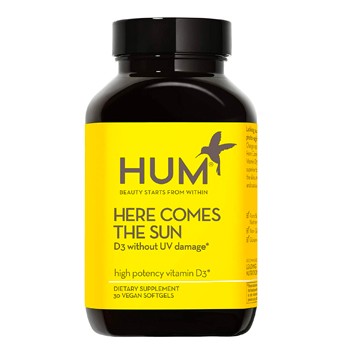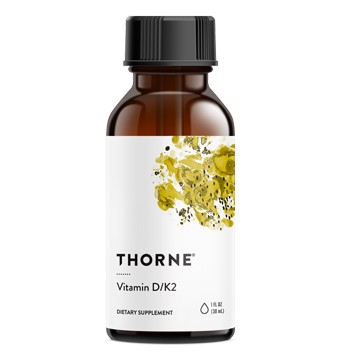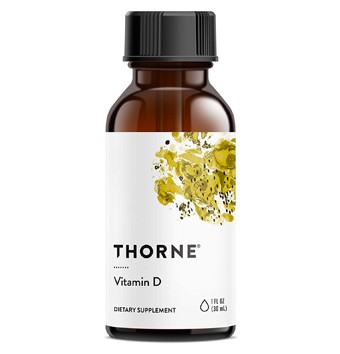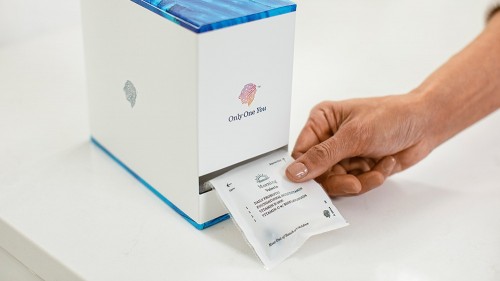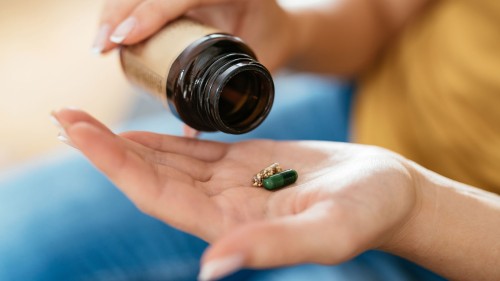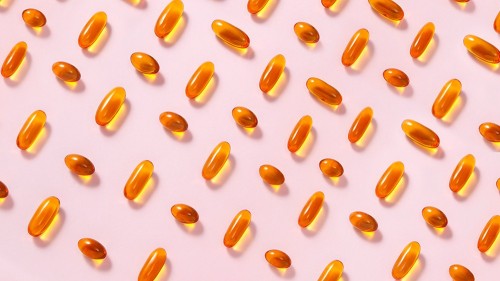WellnessVerge is reader-supported. We may earn a commission when you make a purchase through the links on this page. Learn more about our process here.
Best Vitamin D Supplements of 2023, According to a Dietitian
Last Updated on December 26, 2022
Medically Reviewed by Natalie Olsen, MS, RDN
Taking a vitamin D supplement is an easy and inexpensive way to support healthy vitamin D levels. Choose one that fits your personal preferences and dosing needs.

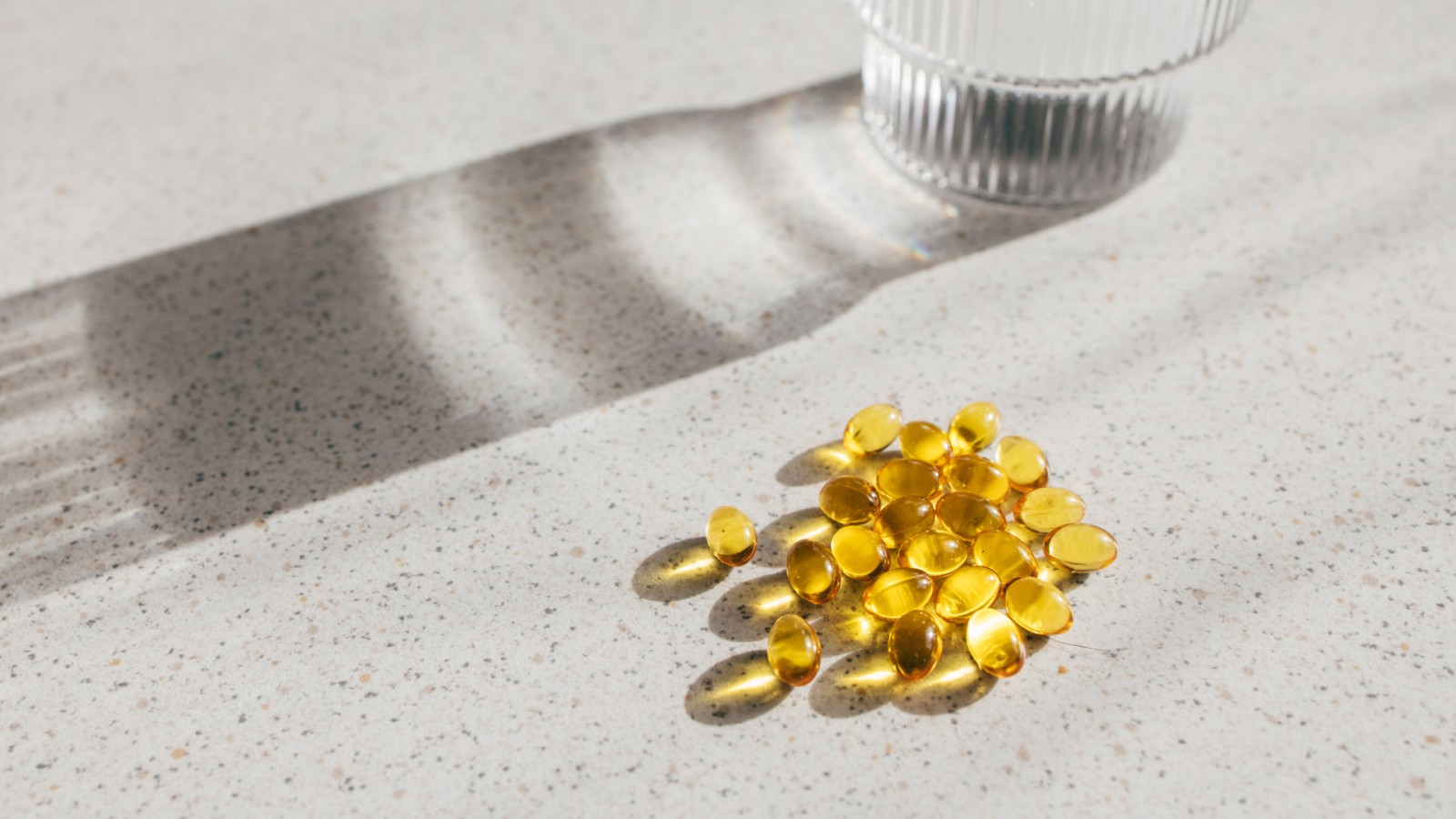
Conversations around the importance of vitamin D generally make their rounds seasonally.
You may notice more headlines about vitamin D levels and sources during the winter months, cold and flu seasons, and times when natural immunity is getting a lot of attention.
But getting enough vitamin D is a good preventive health practice year-round. By maintaining healthy vitamin D levels all the time, you can rest assured that this nutrient is doing its job whenever you need it most.
Taking a vitamin D supplement is a common practice and a simple, convenient way to support your body’s stores of this nutrient.
Here is a list of some of the best vitamin D3 supplements to consider. This includes a variety of delivery methods — including capsules, gummies, liquids, and sprays.
Summary of Our Picks
Best High-Dose
- Garden of Life Vitamin Code Raw D3 5,000 IU
- Pure Encapsulations Vitamin D3 250 mcg 10,000 IU
- Puritan’s Pride Vitamin D3 250 mcg 10,000 IU
Best Vegan
Best Liquid
- Nordic Naturals Plant-Based Vitamin D3 Liquid
- Garden of Life mykind Organics Vegan D3 Organic Spray
- Thorne Vitamin D/K2 Liquid
Best Gummy
- MaryRuth’s D3 Gummies
- Nordic Naturals Zero Sugar Vitamin D3 Gummies
- Nature Made Vitamin D3 2000 IU 50 mcg Gummies
Best Budget Pick
How We Chose These Brands
- Quality of Ingredients: Does the product contain potential allergens, artificial dyes, flavors, or sweeteners? Does the product use vitamin D3 versus D2 for optimal bioavailability?
- Brand Reputation: Is the brand well-known with a respectable reputation? Does it invest in official third-party testing for safety, quality, and purity, or other consumer value verifications?
- Price: How reasonable is the cost per serving compared to other brands? Is the price worth the potential benefit and value?
Best High-Dose
For the purpose of this review, I’m considering a “high-dose” vitamin D supplement to be one that provides more than 2,000 IU per serving.
These types of dosages should only be used under clinical guidance, used temporarily, and would be most appropriate to help correct a diagnosed vitamin D deficiency.
It is best to check your blood levels of vitamin D to see how a certain dose is affecting your levels and adjust from there.
Garden of Life Vitamin Code Raw D3 5,000 IU
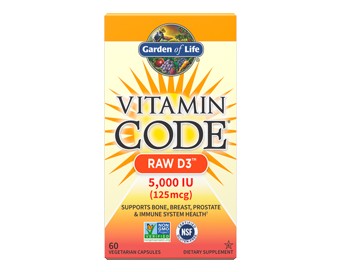
Pros
- The brand invests in Non-GMO Project, Kosher, and NSF Certified Gluten-Free verification, which suggests that they care about quality and consumer values
- Uses whole-foods derived ingredients
- Vegetarian
Cons
- Does not have an official third-party testing seal for overall safety and quality
- Chlorella may pose allergen risk for some people
- The additional ingredients may be overkill for people seeking only a vitamin D supplement
Our Take
Garden of Life Vitamin Code Raw D3 5,000 IU is a high-dose supplement intended to help raise vitamin D levels and provide antioxidants and probiotics from other plant compounds.
This product is made by Garden of Life, a company that emphasizes whole food ingredients, ingredient traceability, and obtaining third-party certifications for their products.
This is a vitamin D3 supplement made using a culture of Saccharomyces cerevisiae, a unicellular fungus.
It also contains cracked wall chlorella, a type of nutrient-dense algae. Chlorella is rich in omega fats and is used in this formulation with the intention of helping promote the absorption of vitamin D.
Additionally, this product contains a raw organic fruit and vegetable blend to provide antioxidants, as well as a raw probiotic and enzyme blend.
In the recommended one capsule per day, you get 5,000 IU (125 mcg) of vitamin D3. If instructed by your healthcare provider, this product could easily be dosed higher to correct a severe deficiency.
Price: $19.59 for 60 capsules on Amazon ($0.33 per serving).
Pure Encapsulations Vitamin D3 250 mcg 10,000 IU
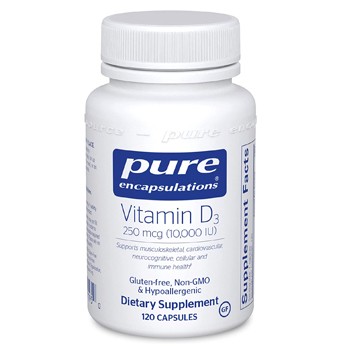
Pros
- Simple formulation that only contains D3 in a plant-based encapsulation
- Can easily adjust and reduce dosage
Cons
- Higher price point compared to other vitamin D supplements
- Temporary dosing recommendation may not be obvious to some consumers
Our Take
Pure Encapsulations Vitamin D3 250 mcg 10,000 IU is a very high-dose supplement intended for short-term or intermittent use under clinical supervision.
Pure Encapsulations emphasizes premium ingredients backed with science and held to high industry standards.
All of their products are free from wheat, soy, dairy, peanuts, tree nuts, eggs, gluten, coatings, artificial colors, flavors, and sweeteners, GMOs, unnecessary fillers and binders, trans fats and hydrogenated oils, and magnesium stearate.
These are vegetarian vitamin D3 capsules derived from cholesterol in lanolin, the oil produced in sheep’s wool. The capsules also contain hypoallergenic plant fiber that comes from pine cellulose.
The product is designed to help support normal bone, cardiovascular, and cellular health.
It contains 10,000 IU (250 mcg) of vitamin D3 per 3 capsules. It is recommended to take only temporarily under the supervision of a healthcare professional.
This is because the dose in these capsules is significantly higher than that of a maintenance dose intended to keep vitamin D levels within normal limits.
The bottle says that these capsules should only be taken once daily for up to five days with a meal, or otherwise directed by a medical professional.
Price: $46.30 for 120 capsules on Amazon ($0.39 per serving).
Puritan’s Pride Vitamin D3 250 mcg 10,000 IU
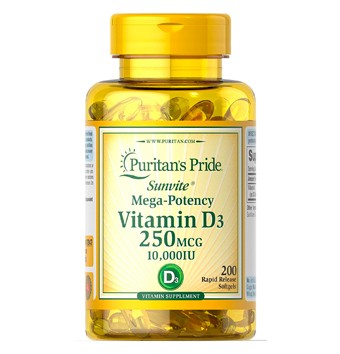
Pros
- Simple formulation containing D3 in a gel capsule
- Inexpensive
- Free from allergens
Cons
- Can’t adjust or reduce dose as serving is 1 capsule
- No official third-party testing seal
Our Take
Puritan’s Pride Vitamin D3 250 mcg 10,000 IU is a high-dose supplement intended to increase low vitamin D levels.
Puritan’s Pride was founded in 1973. They value quality vitamins, customer service, and good pricing for consumers.
This product is labeled as being “high potency” as it’s a high-dosage product that contains 10,000 IU (250 mcg) of vitamin D3 in one softgel.
The only other ingredients include safflower oil, gelatin, vegetable glycerin, and sunflower oil.
Note that because this product contains gelatin, and its vitamin D3 is derived from lanolin, it is not a vegan-friendly option.
One bottle contains 200 softgels. At a dose of one softgel per day, this product should last you approximately 6–7 months.
Price: $6.44 for 200 softgels on Amazon ($0.03 per serving).
Best Vegan
All vitamin D2 (ergocalciferol) supplements are derived from plants, but this form of vitamin D is not as bioavailable as vitamin D3 (cholecalciferol).
The majority of D3 supplements are made from lanolin, the oil produced by sheep’s wool. However, there are several brands that use lichen instead, making them vegan.
HUM Nutrition Here Comes the Sun
Pros
- Simple vegan formulation
- Free from allergens, artificial colors, flavors, and preservatives
Cons
- No official third-party testing seal
Our Take
HUM Nutrition Here Comes the Sun is a simple, vegan softgel that provides a daily maintenance dose of vitamin D per serving.
HUM Nutrition is known to be a high-quality beauty nutrition business, creating products rooted in science and connecting consumers with nutrition professionals to match them with the best products for their needs.
One of their products is this vegan vitamin D3 product, made from lichen.
The other main ingredient in this product is extra virgin olive oil. The vegan softgels are made with tapioca, glycerin, and water.
Each bottle contains 30 softgels, each of which contains 2,000 IU (50 mcg) of vitamin D. This is a nice maintenance dose for most healthy adults.
With a serving size of one softgel per day, each bottle should last you approximately one month.
Price: $12 for 30 softgels on HUM's website ($0.40 per serving).
Future Kind Vegan Vitamin D3
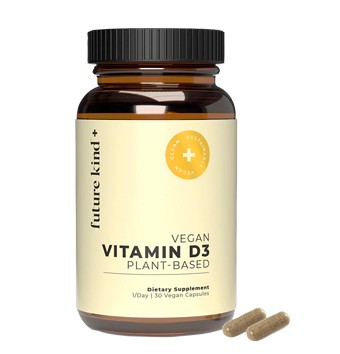
Pros
- Simple vegan formulation
- Slightly higher than maintenance dose, which some people may be seeking
Cons
- No official third-party testing seal
- Higher price point than some similar options
Our Take
Future Kind Vegan Vitamin D3 is a simple vegan capsule that provides just above the daily recommended maintenance dose of vitamin D for most healthy adults.
Future Kind is an Australian company founded in 2019 by vegan nutritionists. Their goal is to design evidence-based products using 100% vegan ingredients, with a foundation of environmental sustainability and science.
Their vegan vitamin D3 supplement is derived from lichen (Cladonia rangiferina) encapsulated using vegetable cellulose and rice flour.
Each capsule provides 2,500 IU (62.5 mcg) of vitamin D per day.
With a serving size of one capsule per day, each bottle should last you one month.
Price: $19.95 for 30 softgels on Amazon ($0.67 per serving).
Doctor’s Best Vegan D3
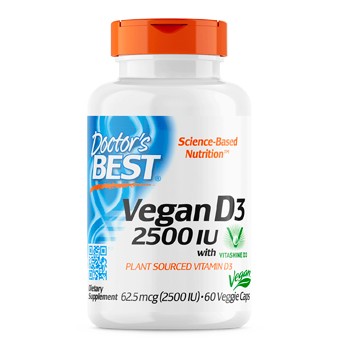
Pros
- Simple vegan formulation using a respected plant-based D3
- Free from allergens
- Slightly higher than maintenance dose, which some people may be seeking
Cons
- Can’t purchase directly from the brand
- No official third-party testing seal
- Uncertain return policy as it depends on the store
Our Take
Doctor’s Best Vegan D3 is a simple vegan capsule made using Vitashine and provides slightly above the recommended maintenance dose for most healthy adults.
Doctor’s Best has been around since 1990, prioritizing science-based ingredients to make high-quality products.
This is a vegan product that contains vitamin D3 derived from lichen.
Officially, they use a vitamin D3 ingredient called Vitashine, which is the world’s only Vegan Society & Vegetarian Society registered plant-source D3.
In addition, this product contains microcrystalline cellulose, modified cellulose, maltodextrin, starch, sucrose, silicon dioxide, d-alpha-tocopherol, and ascorbyl palmitate.
Each capsule contains 2,500 IU (62.5 mcg) of vitamin D3, and the recommended dose is one per day.
Price: $13.93 for 60 capsules on Amazon ($0.23 per serving).
Best Liquid
Many people prefer a liquid supplement instead of having to swallow softgels or chew capsules. Plus, liquid supplements can easily be mixed into smoothies, juices, or other soft foods to help mask any flavor.
Note that many liquid vitamin D supplements need to be stored in the refrigerator, and they tend to have a shorter shelf-life than solid options.
Nordic Naturals Plant-Based Vitamin D3 Liquid
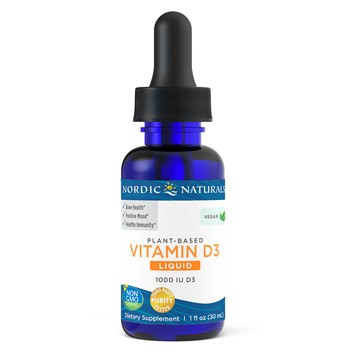
Pros
- Third-party purity tested
- Reviews say the flavor is mild and neutral
Cons
- The serving size only contains 1,000 IU, so if you double this one bottle only lasts 15 days
- Only lasts 3 months in the fridge
Our Take
Nordic Naturals Plant-Based Vitamin D3 Liquid is a vegan liquid vitamin D that provides a daily maintenance dose and can be taken orally or mixed into beverages.
Nordic Naturals is an established and reputable supplement company that offers a number of vitamin D products, including vegan and vegetarian options.
This is a liquid vitamin D3 product that has been third-party purity tested.
In addition to the lichen-derived vitamin D3, the formulation contains medium-chain triglycerides (from coconut oil), natural apple flavor, and d-alpha-tocopherol acetate (a natural antioxidant).
All you need is the easy-to-use measured dropper to dose this product. The suggested serving size is 0.5 milliliter daily, which contains 1,000 IU (25 mcg) of vitamin D.
This product is also non-GMO and hexane-free. It should be discarded three months after opening.
Price: $16.45 for 30 ml/60 servings on Amazon ($0.27 per serving).
Garden of Life mykind Organics Vegan D3 Organic Spray
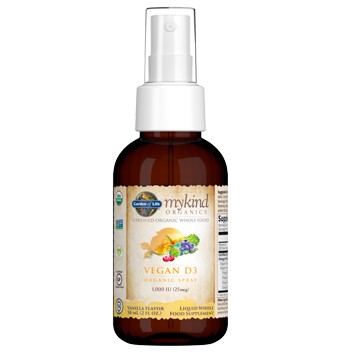
Pros
- Great option for people who don’t want to swallow a capsule or use a dropper
- Inexpensive even if you double your dose
Cons
- Has a 90-day shelf life after opening
- No official third-party testing seal
Our Take
Garden of Life mykind Organics Vegan D3 Organic Spray is a vegan vitamin D spray that provides a daily maintenance dose and is easy to use.
Mykind Organics is a line of products made by Garden of Life.
This product is a vanilla-flavored spray that you can apply directly into your mouth or mix into a beverage.
Each spray contains 1,000 IU (25 mcg) of vitamin D3 derived from lichen.
The formulation also contains a base of pumpkin and cranberry seed oils to help improve vitamin D absorption. This also provides an array of omega 3, 6, 7, and 9 fatty acids.
Other ingredients include organic vanilla flavor, non-GMO vitamin E from sunflower, organic sunflower lecithin, organic rosemary extract for freshness, and organic stevia leaf extract for natural sweetness.
This product is USDA Organic, Non-GMO Project verified, and certified vegan.
Price: $10.95 for 58 ml/125 servings on Amazon ($0.09 per serving).
Thorne Vitamin D/K2 Liquid
Pros
- Easy to use and adjust dosage
- Can add to foods and drinks if desired
- Low price point for a D/K2 product
Cons
- Lower dose per drop than comparable products
Our Take
Thorne Vitamin D/K2 Liquid is an inexpensive, easily adjustable vitamin D3 and K2 product dosage designed to help maintain normal vitamin D levels, with the addition of K2 to further support bone health.
Thorne brand supports personalized scientific wellness. This liquid vitamin D also contains vitamin K2.
The recommended dosage is two drops given 1–3 times per day. Two drops contain 1,000 IU (25 mg) of vitamin D, so your daily dose may range from 1,000 IU to 3,000 IU, depending on how many times you choose to take it.
In a two-drop serving, you’ll also receive 200 mcg of vitamin K2 (menatetrenone).
While research is still emerging, there is some evidence that getting enough vitamin K2 further helps support skeletal health and may have promise for health conditions like diabetes, cancer, and brain health. (1, 2)
Other ingredients include medium-chain triglyceride oil and mixed tocopherols intended to help preserve product freshness.
Each bottle contains approximately 1,200 drops (600 servings), which should last you about six months. Note that this product states that it should not be refrigerated.
Price: $27 for 30 ml/600 servings on Amazon ($0.05 per serving).
Best Gummy
Gummies aren’t just for kids anymore. Many supplement manufacturers are creating gummy versions for adults seeking something a little more fun.
Vitamin D gummies are also a nice option for people who prefer not to swallow pills.
MaryRuth’s D3 Gummies
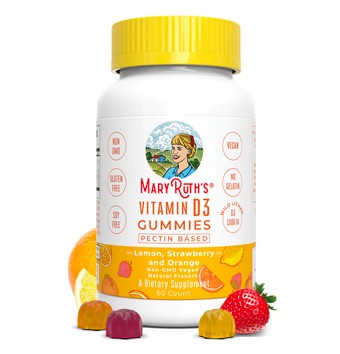
Pros
- Free from allergens and animal products
- Uses non-GMO, natural flavors, colors, and sweeteners
- Can also be used for kids 2 years and older with pediatrician guidance
Cons
- Contains 1 gram of added sugar per gummy
Our Take
MaryRuth’s D3 Gummies are a vegan gummy designed to provide a flavorful maintenance dose of vitamin D.
MaryRuth’s Organics is a family business founded in 2014 with the goal of making wholesome plant-based supplements with high-quality ingredients and minimal potential allergens.
This is a gummy made with vitamin D3 derived from lichen. It also uses pectin, a vegan alternative to gelatin.
Other ingredients include cane sugar, tapioca syrup, purified water, pectin, natural flavors, citric acid, sodium citrate, coconut oil, black carrot for color, beta carotene for color, and carnauba wax. All of which are vegan, non-GMO, and primarily organic.
Each gummy contains 1,000 (25 mcg) of vitamin D, with a recommended serving of one per day. However, you could easily adjust your dosing as needed.
These gummies come in natural fruit flavors, including lemon, orange, and strawberry.
Price: $25.95 for 60 gummies on Amazon ($0.43 per serving).
Nordic Naturals Zero Sugar Vitamin D3 Gummies
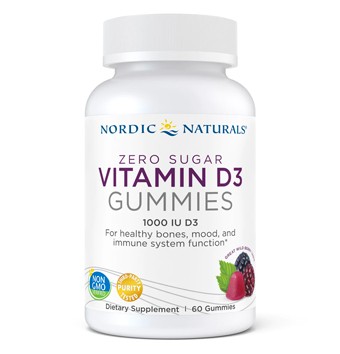
Pros
- Sugar-free
- Third-party purity tested
Cons
- Some reviews say the taste and texture isn’t ideal
- Lower dose per serving than some similar options
Our Take
Nordic Naturals Zero Sugar Vitamin D3 Gummies offer a sugar-free source of vitamin D to help maintain healthy levels.
Nordic Naturals is an established and reputable supplement company that offers a number of vitamin D products.
These are wild berry-flavored gummies, each containing 1,000 IU (25 mcg) of vitamin D3.
Other ingredients include soluble tapioca fiber, purified water, pectin, citric acid, natural flavor, sodium citrate dihydrate, fruit and vegetable juice for color, sunflower oil, and carnauba wax.
There is no gluten, milk derivatives, or artificially derived colors or flavors in these gummies. Additionally, they contain no added sugar, instead using the sugar alcohol xylitol for sweetening purposes.
These gummies are non-GMO and third-party purity tested.
Price: $16.79 for 60 gummies on Amazon ($0.28 per serving).
Nature Made Vitamin D3 2,000 IU (50 mcg) Gummies
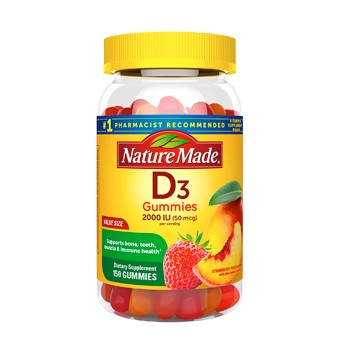
Pros
- Simple formulation containing D3 in a gummy
- Inexpensive
- Free from allergens
Cons
- No official third-party testing seal
Our Take
Nature Made Vitamin D3 2000 IU (50 mcg) Gummies are an inexpensive USP verified maintenance dose of vitamin D.
Nature Made has been around since 1971, and many of its products are USP verified, including several of its D3 gummies.
This brand makes vitamin D3 gummies that provide a 1,000 IU, 2,000 IU, and 5,000 IU per serving dosage.
Additional ingredients in their 2,000 IU (50 mcg) gummies include glucose syrup, sugar, water, gelatin, citric acid, palm oil, natural flavors, malic acid, tartaric acid, carnauba wax, and colors.
Each bottle contains 45 servings, which should last approximately a month and a half if used daily.
Price: $13.95 for 90 gummies on Amazon ($0.31 per serving).
Best Budget Pick
As many people experience vitamin D deficiency, taking a vitamin D supplement is often a long-term daily routine. This means that choosing a vitamin D supplement that doesn’t break the bank is an important factor for many consumers.
Here are a couple of budget-friendly vitamin D3 picks.
Thorne Vitamin D Liquid
Pros
- Easy to use and adjust dosage
- Can add to foods and drinks if desired
- Low price point
Cons
- Lower dose per drop than comparable products
Our Take
Thorne Vitamin D Liquid is an inexpensive, easily adjustable vitamin D3 dosage designed to help maintain normal vitamin D levels.
The Thorne brand supports personalized scientific wellness. They create a wide range of supplemental products, including this liquid vitamin D.
The recommended dosage is two drops given 1–3 times per day. Two drops contain 1,000 IU (25 mg) of vitamin D, so your daily dose may range from 1,000 IU to 3,000 IU, depending on how many times you choose to take it.
Other ingredients include medium-chain triglyceride oil and mixed tocopherols intended to help preserve product freshness.
Each bottle contains approximately 600 servings, which should last you several months. Note that this product states that it should not be refrigerated.
Thorne also makes vitamin D3 in a higher dose (10,000 IU per serving) option.
Price: $15 for 30 ml/600 servings on Amazon ($0.03 per serving).
NOW Vitamin D-3 5,000 IU
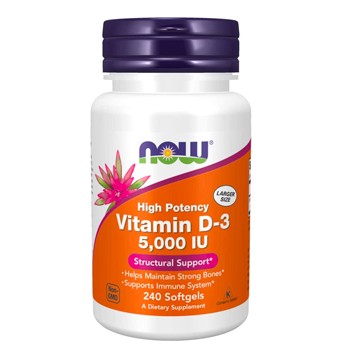
Pros
- Low price point
- Higher dose, which could be taken less frequently to extend each bottle further
Cons
- No official third-party testing seal
- Higher than maintenance dose per softgel, so consumers need to be careful not to take daily for prolonged periods or without supervision of their healthcare professional
Our Take
NOW Vitamin D-3 5000 IU is a low-cost, high-dose vitamin D3 supplement that contains minimal ingredients and could last a consumer several months.
NOW is a family-owned brand created to empower healthy living. Their brand also supports Vitamin Angels charity, providing lifesaving vitamins to mothers and children at risk of malnutrition.
This product is a higher dose vitamin D3, with each softgel containing 5,000 IU (125 mcg) of vitamin D3 derived from lanolin.
The other ingredients include extra virgin olive oil and softgel capsules made with bovine gelatin, water, and glycerin.
Each bottle contains 120 softgels. With a serving size of one softgel per this, each bottle should last you approximately four months.
Price: $11.86 for 240 softgels on Amazon ($0.05 per serving).
Things to Consider When Shopping for a Vitamin D Supplement
There are plenty of vitamin D supplements on the market. To narrow down the best choice for you, consider the following:
Form
Vitamin D comes in two forms:
- Vitamin D2 (ergocalciferol): a naturally plant-derived using yeast.
- Vitamin D3 (cholecalciferol): largely derived from lanolin, a waxy substance produced by sheep’s wool.
Either can be used. However, research shows that vitamin D3 is more effective for raising blood levels of vitamin D than vitamin D2, and maintaining them for longer. (3)
This is particularly important if you’ve been diagnosed with vitamin D deficiency and need a high-dose, highly bioavailable form to correct it.
Overall, I think choosing D3 whenever possible is a good idea and a better investment for most people.
Another reason form may matter to you is because most vitamin D supplements are animal-derived. If you practice a plant-based lifestyle or prefer a vegan supplement, this is something you will have to look for on each product.
Vegan supplements are generally well-labeled, and the source is typically noted on the ingredient label.
Note that while vitamin D2 is always plant-derived, there are a growing number of vitamin D3 supplements that are made using lichen, an organism that arises from cyanobacteria.
Dosing
Dosing for vitamin D supplements can be all over the map.
The Endocrine Society recommends a daily dose of 600 to 1,000 IU for children from 1 to 18 years, and 1,500 to 2,000 IU for adults to help meet and maintain normal vitamin D levels. (4)
A diagnosed deficiency will generally be treated with a higher dose of vitamin D supplementation for a temporary period, as directed by your healthcare provider.
It’s important to dose appropriately. Because vitamin D is a fat-soluble vitamin, it can pose a risk for toxicity if you take unnecessary high doses and accumulate too much in your body.
In fact, the Endocrine Society recommends not taking more than 4,000 IU per day of vitamin D for kids or more than 10,000 IU per day long-term for adults without medical supervision because of this risk. (5)
I would recommend erring on the side of caution and speaking to your doctor before taking anything higher than the standard dosage.
Another reason it’s important to choose an appropriate dosage is because other supplements you’re taking may also contain vitamin D.
For instance, most daily multivitamins have vitamin D in them, as do certain omega-3 supplements and products designed for bone, brain, and immune health.
Before adding more vitamin D to your routine, be sure you know where else it may be hiding in your medicine cabinet.
It’s prudent to have your blood vitamin D levels checked before starting a supplement to determine the right dosage for you.
This can easily be added to your bloodwork at an annual wellness exam, requested through your physician, or ordered using direct access testing at any time.
Third-Party Testing
I always recommend looking for dietary supplements that bear an official third-party testing seal on their packaging.
This indicates that the product has been independently evaluated for things like safety and quality, and has been verified to contain what it says to contain.
Some of the most reputable third-party testing companies for supplements include NSF International, ConsumerLab, and USP.
Vitamin D 101
What Is Vitamin D?
Vitamin D, also called “the sunshine vitamin,” is an important nutrient that many of us aren’t getting — or making — enough of today.
Your skin helps produce vitamin D for your body when it’s exposed to direct sunlight. However, most of us either don’t live in a place where regular direct sunlight is available year-round, or we’re more often covered up by sunscreen or sun-protective clothing than not.
Vitamin D is a fat-soluble vitamin. This means that it’s best absorbed in the presence of dietary fat and dissolves in the presence of fats and oils.
Unlike water-soluble vitamins (like vitamin C and the B vitamins), fat-soluble vitamins are not excreted daily, instead, they accumulate in the fatty tissues of your body where they are stored.
Keeping your vitamin D storage in a healthy range is important.
Vitamin D is found in some foods, but not everyone consumes them as part of their regular diet. One of the best dietary sources of vitamin D is fatty fish, such as tuna, mackerel, and salmon.
Other sources include egg yolks, some types of mushrooms grown using ultraviolet light, and foods that have been fortified with vitamin D, like certain milk and orange juices.
How Much Vitamin D Do You Need?
Optimal blood levels of vitamin D are at least 50 nmol/L, which is considered adequate for bone health and overall health among healthy adults. (6)
Having levels below 30 nmol/L indicate deficiency and are associated with an increased risk for bone health concerns. Likewise, levels over 125 nmol/L can also be problematic.
Studies have found that vitamin D deficiency is a worldwide public health concern. It’s estimated that over 50% of the global population has lower than ideal vitamin D levels. (7)
Getting enough vitamin D matters because it’s heavily involved in things like immune function, bone health, inflammation, and mood regulation. (6)
Being deficient in vitamin D may even increase your risk for a number of chronic diseases over time. (8)
Fortunately, correcting a vitamin D deficiency and maintaining healthy levels can easily be done by taking a vitamin D supplement, especially if you have darker skin or don’t get enough sun exposure or vitamin D in your diet.
It is best to take vitamin D with a fat for optimal absorption. Some Vitamin D supplements contain a fat, like oil, while some do not and will need to be taken with a fat.
Frequently Asked Questions
Is vitamin D vegan?
Vitamin D2 (ergocalciferol) is always vegan, but vitamin D3 (cholecalciferol) is not.
Most vitamin D3 is made using lanolin, oil produced in sheep’s wool. However, there are several vitamin D3 products that are vegan and made using lichen instead. This will be indicated on the product.
How much vitamin D should I take?
The most accurate dosage for you should be based on your blood levels of vitamin D, as this will tell you whether you need a maintenance dose, a dose to correct a deficiency, or if you don’t need a vitamin D supplement at all.
The Endocrine Society recommends a standard dose of 1,500–2,000 IU per day for most healthy adults to maintain normal vitamin D levels. They do not recommend taking more than 10,000 IU daily for long periods of time.
How do I know if I should take a vitamin D supplement?
The only way to know what your blood levels of vitamin D are is to get a lab test.
From here, you can work with your healthcare provider to determine whether you get enough vitamin D from your current lifestyle, or if a supplement would be helpful for maintenance or to correct a deficiency.
What’s the best form of vitamin D to take?
You can take either vitamin D3 or vitamin D2, but research has shown that D3 is more effective for raising and maintaining blood levels of vitamin D.
As for delivery method, whether you choose a vitamin D supplement in the form of a liquid dropper, a spray, a capsule, a gummy, or a softgel is entirely up to you and your personal preference.
Should I take vitamin D with vitamin K2?
Some research suggests that taking vitamin D and vitamin K2 together can have synergistic benefits for bone health. However, more detailed research is needed. (9)
Check with your healthcare provider about whether you should take them combined.
Taking an appropriately-dosed vitamin D3 supplement on its own is likely sufficient for most people, but adding K2 is an option.
The Bottom Line
Vitamin D is a critical nutrient for health, but many of us don’t maintain enough of it in our bodies. A supplement is an easy and generally inexpensive way to support healthy vitamin D levels.
Before choosing a vitamin D supplement, consider your preferences as far as a delivery method and whether it’s a plant-based or animal-derived product. Opt for vitamin D3 versus vitamin D2 for optimal bioavailability, especially if you’re correcting a deficiency.
The best way to know if you need a vitamin D supplement and what dose to take is to have your blood levels checked. Always speak with your healthcare provider before starting a vitamin D supplement, especially with a high dosage.
At WellnessVerge, we only use reputable sources, including peer-reviewed medical journals and well-respected academic institutions.
- Calcium, vitamin D, vitamin K2, and magnesium supplementation and skeletal health:
https://pubmed.ncbi.nlm.nih.gov/32972636/ - Vitamins K1 and K2: The Emerging Group of Vitamins Required for Human Health:
https://www.ncbi.nlm.nih.gov/pmc/articles/PMC5494092/ - Relative Efficacy of Vitamin D2 and Vitamin D3 in Improving Vitamin D Status: Systematic Review and Meta-Analysis:
https://www.ncbi.nlm.nih.gov/pmc/articles/PMC8538717/ - National Center for Biotechnology: Vitamin D Information:
https://www.ncbi.nlm.nih.gov/books/NBK441912/ - Chapter 57B - The IOM—Endocrine Society Controversy on Recommended Vitamin D Targets: In Support of the Endocrine Society Position:
https://www.sciencedirect.com/science/article/pii/B9780128099650000598#:~:text=The%20IOM%20specified%204000%20IU%2Fday%20for%20most%20children,for%20most%20children%20and%2010%2C000%20IU%2Fday%20for%20adults. - National Institutes of Health: Vitamin D:
https://ods.od.nih.gov/factsheets/vitamind-healthprofessional/ - Global Overview of Vitamin D Status:
https://pubmed.ncbi.nlm.nih.gov/29080639/ - Vitamin D and Chronic Diseases:
https://pubmed.ncbi.nlm.nih.gov/28580189/ - Vitamins D and K as pleiotropic nutrients: clinical importance to the skeletal and cardiovascular systems and preliminary evidence for synergy:
https://pubmed.ncbi.nlm.nih.gov/21155624/

